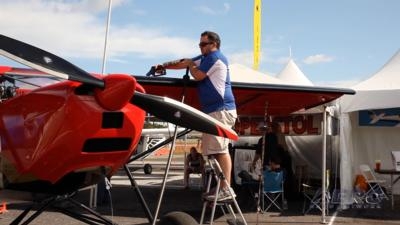Mon, Apr 22, 2024
Inquiry Was Sparked By the University of North Dakota (UND) Aviation Program's Experience
In a significant development impacting piston-engine aircraft operations, Lycoming Engines has released an update on its investigation into valve seat recession observed in engines using UL94 fuel.

The inquiry was sparked by the University of North Dakota (UND) Aviation program's experience after switching its fleet to UL94, a 94-octane unleaded fuel, in June 2023. Despite initial positive outcomes, UND detected abnormal valve seat recession after logging 46,000 flight hours with the new fuel, prompting a return to the traditional 100LL avgas in October.
Lycoming's root cause analysis revealed that while the engine and airframe components meet specifications and are unlikely contributors to the issue, the characteristics of UL94 under certain operational conditions could indeed influence valve seat durability. Key findings suggest that the aromatic concentration in UL94, although not currently regulated by ASTM D7547--the standard specification for hydrocarbon unleaded aviation gasoline--may affect engine valve seats. Higher aromatic levels can alter flame speed and increase particulate abrasiveness, subsequently accelerating valve seat wear.
Responding to these findings, Lycoming is collaborating closely with the FAA to examine how different piston engines respond to variations in fuel aromatics. This partnership aims to refine fuel standards and provide clearer guidelines for aircraft operators on managing fuel use, particularly how leaning techniques could mitigate potential issues associated with high aromatic concentrations.

This investigation is part of Lycoming's commitment under the FAA's Eliminate Aviation Gasoline Lead Emissions (EAGLE) initiative. The project seeks to replace leaded avgas with a high-octane unleaded alternative by 2030, ensuring a safer and more environmentally friendly future for aviation. Through continued research and industry collaboration, Lycoming aims to enhance fuel formulations to prevent mechanical issues and support the aviation sector's transition to unleaded fuels.
More News
From 2023 (YouTube Edition): New Propulsion Scheme Optimized for AAM Applications Founded in 2017 by Eric Bartsch, Pat Anderson, and Erik Lindbergh (grandson of famed aviation pion>[...]
During The Initial Climb, The Engine Began To Operate Abnormally And, After About Three Seconds, Experienced A Total Loss Of Power On October 29, 2025, about 1820 Pacific daylight >[...]
Aero Linx: Women in Aviation International Women in Aviation International is the largest nonprofit organization that envisions a world where the sky is open to all, and where avia>[...]
“We’ve paid for the cable line’s repair for the customer and have apologized for the inconvenience this caused them...” Source: Some followup info from an A>[...]
“We have long warned about the devastating effects of pairing optimization. Multiple times over many months, we highlighted how schedule manipulation, unbalanced schedules, a>[...]
 Classic Aero-TV: VerdeGo Debuts VH-3 Hybrid-Electric Powerplant
Classic Aero-TV: VerdeGo Debuts VH-3 Hybrid-Electric Powerplant NTSB Prelim: Grumman American Avn. Corp. AA-5B
NTSB Prelim: Grumman American Avn. Corp. AA-5B ANN's Daily Aero-Linx (12.02.25)
ANN's Daily Aero-Linx (12.02.25) Aero-News: Quote of the Day (12.02.25)
Aero-News: Quote of the Day (12.02.25) Aero-News: Quote of the Day (12.03.25)
Aero-News: Quote of the Day (12.03.25)




